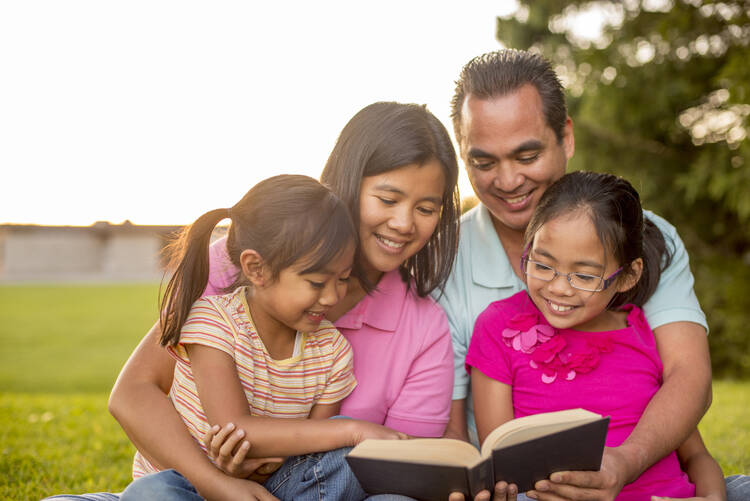Many parents are familiar with the ritual of dropping kids off at parish curbsides once a week for religion class and retrieving them an hour later. This system of education for educating children who do not attend Catholic school is widely accepted. But is this the best way to educate our children in the faith? Many young adults who have completed their catechesis now find themselves disconnected from the church. How can religious education help lay the groundwork for a more lasting faith?
A small movement of lay and clergy is expressing its concern with the traditional system, saying it needs to involve the entire family in the faith formation process. Family-centered religious education programs are finding their way into parishes around the country, helping entire families to explore and grow in their faith together.
“It’s a paradigm shift for the church that dates back to the time before we had Catholic schools, when parents passed on the faith from one generation to the next by what they did in the home,” says Dennis Corcoran, pastoral associate at Church of Christ the King in New Vernon, N.J., who helped his parish launch its family-based religious education program 11 years ago and now, as head of his own consulting firm, is opening the door for other parishes in three states to do the same.
“Nobody is really happy with the old C.C.D. model,” he added. “Parents are rodeoed into doing it. Family-based religious education, on the other hand, has brought a refreshing energy to our parish by bringing together all these families who used to be incommunicado if they didn’t attend church on Sunday.”
Alternative programs like family-based religious education spread Catholic teaching through Scripture, prayer and meaningful activities that take place during monthly two-hour gatherings at the parish. The gatherings include breakout groups for children, so they can get age-appropriate lessons (including sacramental prep), while parents meet on their own. Just as important as these sessions, though, is the family formation that takes place away from the parish, in the home, during the rest of the month. And therein lies the biggest difference between family-based initiatives and more classroom-based models: the role of parents as catechists.
“I’m convinced that religious education really starts with parents, and it helps when they have the mindset that this process is not confined to a few years, but is a lifelong journey they need to model for their children,” says Father Andrew Prachar, pastor at Little Flower Parish in Berkeley Heights, N.J.
Little Flower is currently building a family-based program within its 1,400-family suburban community. “Family-based catechesis gives us the opportunity to work with the adults to show them how to do this,” says Father Prachar. “It’s taking what Pope Francis has been saying about engaging people on the fringes.”
Winning Over Families
With the support of pastor Father Joel Warden and religious education director Father Anthony Andreassi, Assumption of the Blessed Virgin Mary Church in Brooklyn Heights, N. Y., became a convert to family-based religious education last fall. And in just six months the program grew from six families to 33 as parents took warmly to the idea of turning the spiritual education of their kids into a family experience. The monthly Sunday-evening sessions begin with pizza and salad before moving on to readings from—and a deep dive into—that week’s Gospel. Materials are also distributed to stimulate dialogue at home. For the program’s first month parents receive a book of prayers they can recite with their kids. For the second month they receive an illustration of the rosary with a lesson on how and why it should be prayed.

“What I like most is that the entire family is in this program together, and that sends a good message to the kids and to other families around us that we are both a family community and a church community,” says Megan Healey, a mother with three school-age children in the program.
That thought is echoed by Ann Imrick, director of religious education at Blessed Sacrament Parish in Burlington, N. C., whose family-based religious education program was so well received it is no longer optional.
“This is about formation, not just information, and if parents are going home and not living the faith with their families, the program isn’t going to stick,” she insists. “Hopefully what’s happening is that the adults are becoming more comfortable sharing their faith with their children and talking about God, and they’re participating more in the liturgy and the sacraments.”
Because of the demographics of Blessed Sacrament—70 percent of its families are Spanish-speaking and many parents are unable to read—adopting family-based religious education was both a challenge and an opportunity. “We were two communities functioning under one roof,” observes Father Paul Gabriel, who was pastor at the time the program was introduced in 2013.
Blessed Sacrament responded with a well-rounded family-based program that has an adult formation component (in English and Spanish) as part of its monthly evening meetings. Parents who struggle to follow the written materials are able to sit down with the parish’s director of Hispanic ministry and receive verbal explanations of the family activities. This dynamic created a much-welcomed opportunity for parish leaders. “I got the chance to meet people I wouldn’t have otherwise, since many of them don’t go to church,” says Father Gabriel. And what he learned from mixing with parents in an informal, relaxed setting was that they “were thrilled with the program because it got them talking about their faith with their children.”
With 240 families enrolled at Blessed Sacrament’s K-8 program, Imrick and her staff of three volunteers do considerable research and planning to make each session engaging for all. After spending time in break-out sessions reading the Gospel, participants reconvene for a family activity during the final half-hour. “This is where the creativity comes into play,” says Ms. Imrick. “One time we might play a little game, another time we might have a prayer service or do a craft or skit. The nice thing about our program is that it has a good deal of flexibility.”
The family-based program at Church of Christ the King in New Jersey also strives to be relevant. Junior high participants, for example, have been treated to slide shows from older students who have returned from parish-sponsored outreach missions to Guatemala, Appalachia and an urban soup kitchen in New Jersey. “The message from these presentations was that when you serve others, you serve Christ,” says Dennis Corcoran, whose own four children have completed the family-based program. “They’ve been huge hits.” Another measure of the program’s overall success: since it began, some 40 non-Catholic parents whose kids were attending family-based religious education converted to Catholicism.
Resistance to Change
Given the positive results many family-based efforts have achieved, why aren’t more parishes on board? The answers are varied: reluctance to change the way things have always been done; wariness to commit the time, resources and energy; and skepticism on the part of bishops and priests toward shifting the locus of children’s faith formation from a controlled classroom to the home.
“There’s no question it’s a huge undertaking for a parish,” acknowledges Mr. Corcoran. Overcoming the resistance to change, he says, will require the determined support, leadership, organizational skills and energies of parents.
“We need to dispel the myth that a book and a teacher are sufficient to pass on the faith,” says Mr. Corcoran. “Our church’s 2000-year tradition has always counted on the family, specifically parents, to take their faith to the next generation. Family-based religious education is intergenerational and brings us back to being lifelong learners of our faith. It’s a much more holistic approach than C.C.D., and the fact a growing number of parishes are embracing it is a very hopeful sign.”








